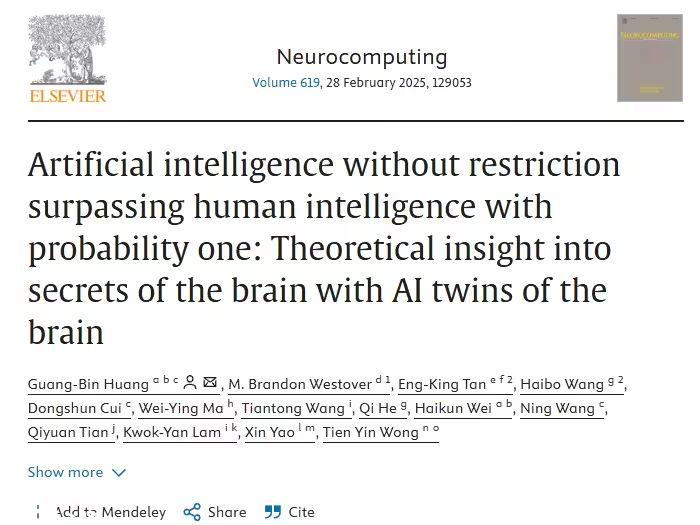February 11th.Southeast UniversityPrincipal Professor Guangbin Huang, Chief Professor of the School of Automation, and a team of international researchers published a paper in the international academic journal Neurocomputing, which not only solves a 70-year-long controversial problem in the field of AI, but also opens up a new research direction for the integration of AI and brain science.

Prof. Huang Guangbin, in collaboration with Harvard Medical School, Tsinghua University, National University of Singapore, Nanyang Technological University, National Institute of Neuroscience, and National Institute of Neuroscience, Singapore.AIThe academic paper titled "Unrestricted artificial intelligence will definitely surpass human intelligence: Using brain AI twin theory to understand the secrets of the brain" was published by the Institute for Security Studies, Sun Yat-sen University, Lingnan University in Hong Kong, and other scientific research institutions.
The research team proposed a novel cell-level AI twinning approach, which theoretically demonstrates that unconstrained AI can approximate the human brain and its functional systems with arbitrarily small expected errors by building AI systems from the bottom up from the physical components of the human brain (e.g., neurons, synapses, etc.). This discovery suggests that human intelligence is only a subset of nature's intelligence, and that AI has the potential to surpass human intelligence.
In addition, the research validates Frank Rosenblatt's 70-year-old conjecture that artificial neural networks have great potential to perform complex functions such as walking, talking, observing, writing and even self-replicating.
for Does AI have the ability to invent?Research has shown that AI twins are able to simulate brain functions with high precision, and therefore have the potential to be inventive and may even help humans discover fundamental principles and theorems of nature.
And is the error back propagation algorithm applicable to the brain?The study points out that the algorithm is not feasible on unidirectional biological components of the brain, such as neurons and synapses, and that its high-energy properties are unrealistic in a biological environment.
The official website of Southeast University shows that Huang Guangbin is the chief professor of Southeast University, served as a member of the Recruitment Committee for Full Professors of the Department of Engineering of Nanyang Technological University, Singapore, Wallenberg (Wallenberg)-Nanyang Technological University Presidential Postdoctoral Scholarship Committee, China's Ministry of Industry and Information Technology, China's Big Data Industry Ecological Union, the director of the expert committee, the China Dredging Association, vice chairman of the Intelligent Expert Group.
Guangbin Huang has been recognized by Thomson Reuters as a "Highly Cited Researcher" (Engineering and Computer Science) and "The World's Most Influential Scientific Minds" for nine consecutive years since 2014. The World's Most Influential Scientific Minds", and was ranked No. 1 in Stanford University's 2021 Top2% World Scientists Singapore Nanyang Technological University. He has been nominated for the Singapore President's Award for Science for several years (2016,2017,2018,2019).
Two of Huang's AI articles were ranked by Google Scholar in 2017 as Top 2 and Top 7 of the world's "Top 10 Time-Tested Artificial Intelligence Classics of the Past 10 Years".
The AI theories proposed by Guangbin Huang have also recently received direct biological validation from biology and brain neurology, bridging the gap between machine learning and brain learning mechanisms, and solving the 60-year-old confusion of John von Neumann, the father of computers, about the structure and capabilities of the human brain and computers. He has been invited to give AI presentations at major international conferences, including IEEE ICONIP, IEEE China Software Conference, and World Architecture Summit. He is an Associate Editor for the journals Neurocomputing, Cognitive Computation, Neural Networks, and IEEE Transactions on Cybernetics.
1AI Attach the address of the paper:
https://doi.org/10.1016/j.neucom.2024.129053